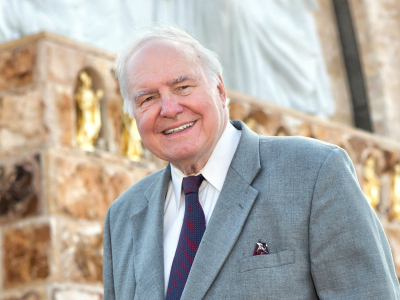

Michael Novak, former ambassador to the United Nations Commission on Human Rights, has joined The Arthur and Carlyse Ciocca Center for Principled Entrepreneurship at the University’s Tim and Steph Busch School of Business and Economics as a distinguished visiting fellow.
Novak is a highly awarded and recognized philosopher, author, and diplomat. His many honors include receiving the Templeton Prize and serving as ambassador to the UN Commission on Human Rights in 1981 and 1982.
His insight into the spiritual foundations of economic and political systems has secured his place among the most influential thinkers of our time, according to Andreas Widmer, director of The Arthur and Carlyse Ciocca Center for Principled Entrepreneurship. Novak is the author of more than 45 books on topics as varied as capitalism, human rights, labor union history, sports, peace, families, and the role of churches in a pluralistic world. He has taught at Harvard, Stanford, and Notre Dame, as well as previously at The Catholic University of America.
"We are thrilled to welcome Ambassador Novak to the faculty," said Widmer. "When you talk about the intersection of faith and economic activity, Michael Novak is essentially the founding father of that discussion. There is probably not one professor here at The Busch School who hasn't been influenced in some fashion by his thinking," Widmer continued.
The Arthur and Carlyse Ciocca Center for Principled Entrepreneurship promotes a person-centered approach to entrepreneurship, integrating business principles with the life of virtue. The center educates students, coaches promising young entrepreneurs, and supports research and projects dedicated to enterprise solutions to poverty.
"I'm delighted to be back at Catholic University, "especially at The Busch School and The Arthur and Carlyse Ciocca Center for Principled Entrepreneurship because of its mission to show the power of Catholic social doctrine to lift people out of poverty and encourage human flourishing," said Novak. "If, as a teacher you want to reach the 1.2 billion Catholics in the world, many of whom are poor, where better to be?"